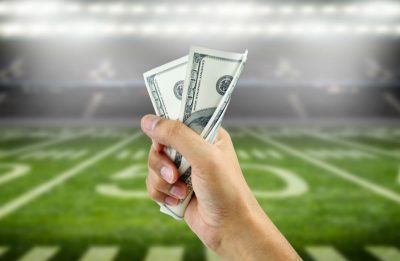
Introduction
You might not realize but your vocabulary probably contains a lot of gambling terms or phrases. A lot of them relate to behavior from the casino tables transferred to everyday life and we’ll be looking at a list of 10 gambling terms used in everyday language.
If you play your cards right
The UK television show Play Your Cards Right was a massive hit in the 90s, hosted by the late Bruce Forsyth. But where does the phrase come from? Well, it’s tough to say exactly but one of the earliest uses came in the 17th century (as seen in this Quora answer). Its general meaning relates to a positive outcome generated by strategic behavior. From a gambling perspective, this is a general comment on any card game like poker or baccarat where you compete with other players or a dealer and there are multiple strategies you can play.
Hedges their bets
This has nothing to do with gardening. In gambling, it means “to avoid committing oneself; to leave a means of retreat open”. The word “hedge” has been used as a verb since the 16th century, featuring in Shakespeare’s Merry Wives of Windsor for example. Since then, it has contributed to an actual gambling strategy known as hedging or hedge betting. It has also been used in finance and you’ll have heard the most popular use – “hedge fund”. It’s all about reducing potential risks in regular parlance but it can have a lucrative meaning when money is involved.
Play close to the vest
Now, I can’t imagine anyone wearing just a vest would be allowed in a casino to play anything but “playing close to the vest” has a specific meaning in the gambling world. In its original form, the phrase is literal. It relates to card players holding their cards so close to them, nobody can see what their hand is. That kind of cautious behavior can easily transfer to everyday life and it has. Nowadays it means to be careful and cunning when making decisions and not let anyone in on what you’re planning.
Sweeten the pot
Winnie the Pooh would love this phrase but it has nothing to do with honey. It comes from the idea of players throwing chips down and making the “pot” (or winner’s pool) bigger and therefore “sweetening” it. Because what could be sweeter than a big win? It’s used in everyday language to denote an increased favor in an incentive (e.g. offering money and an additional free meal in exchange for work). The phrase “sweeten the deal” is also used to the same effect. But I’m sure for Winnie, he’d be looking for another pot of honey.
Crapshoot
This isn’t as bad as it looks. A crapshoot is basically a game of craps, a dice game where you wager on the outcome. Its non-gambling meaning generalises the game; “a venture with a highly risked or unpredictable outcome” according to Wiktionary. This meaning is mostly used in the United States and its most famous use was on an episode of the West Wing:
“The negotiations are a crapshoot. Whole damn job’s a crapshoot.”
It seems fitting that it was used on a show about the government, given how uncertain the landscape of the Conservative government will look in a few months. Maybe betting on the next Prime Minister will seem like less of a crapshoot and more of a hedged bet.
All bets are off
The original meaning is obvious – any bets already placed are voided and no more bets will be taken, likely due to an event cancellation or an irregularity. This was mostly used for horse racing at the track, where money was placed with a bookie but it also referred to general sportsbooks where bets could be nulled and voided for a host of reasons. But the everyday phrase is much broader. It can indicate an event in the future is no longer as certain as it first seemed so “anything can happen” but the event isn’t necessarily cancelled.
Bet your bottom dollar
In the words of Annie, “the sun will come out tomorrow. Bet your bottom dollar that tomorrow there’ll be sun.” You can work out what this means in general terms – it’s a certainty. The “bottom dollar” in this phrase denotes the last of someone’s money so “betting your bottom dollar” is wagering your last bit of cash. Because of the high risk if you lose (you’ll be broke), you’d only do it if you were absolutely sure and any who suggests you do has to be certain as well. But there have been plenty of stories involving gamblers’ last coins winning them big on the slots games.
Russian Roulette
This is an interesting one because there is no official game called Russian Roulette relating to the casino game. One of the first uses of the term came from a short story of the same name by Swiss writer Georges Surdez. The story goes that a Russian soldier pulled out his revolver left one bullet in the barrel, spun it, snapped it in place, and pulled the trigger against his head. With six chambers and one bullet, the chances of blowing your head off is 20% (ignoring any scientific reasoning that’d effect the outcome). The closest link to the roulette casino game is the spinning of a wheel (or barrel) and the risk involve with the spin.
No dice
Other than an album by British rock band Badfinger in 1970, no dice is an American phrase dating back to the early 20th century. Gambling with dice was illegal and players would often hide them to avoid prosecution, some going as far as swallowing them (certainly more painful than “swallowing your pride”). When gambling crimes went to court, many cases were thrown out if there were no dice handed in as evidence which lead to the phrase “no dice – no conviction” and eventually, “no dice”. Nowadays, it means a rejection of a proposal and doesn’t need a judge or jury to confirm it.
Poker face
When’s the last time you tried not to laugh at a joke or give away a reaction to something? The better you are at it, the better your “poker face”. As the name suggests, this comes from the card game where a player would try to remain expressionless so other players couldn’t tell if they had a good hand or not (any kind of expression is known as a “tell” – pulling of ears, nose scratching, coughing, eyebrow twitching). Therefore your poker face is that lack of expression.
Conclusion
Some honorable mentions include blue chip, double down, up the ante, and aboveboard. It’s amazing how a pastime that is illegal in many countries could have generated so many phrases used in everyday language. In some ways, it’s a form of “verbal laundering” but without the risk of jail. The power of the English language, eh?










